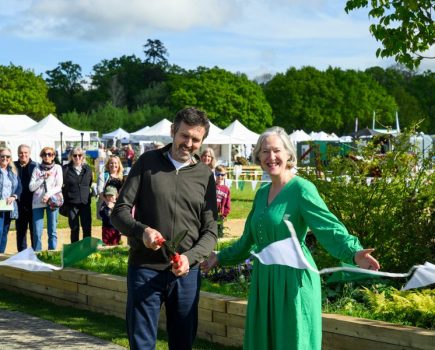OCTOBER 29, 2009: Climate change is set to have a dramatic impact on food production in the South West, and could alter the region’s idyllic landscape forever, according to Professor Ian Mercer, the first chief executive of the Dartmoor National Park Authority
For millennia, the South West has primarily been a grass-growing region, with ancient and modern farming practices shaping the landscape to what it is today, says Prof Mercer. But as our climate heats up, the region could become more suited to Mediterranean-type crops, potentially reducing opportunities for livestock production and changing the landscape for which the South West is famous. Professor Sir Brian Hoskins, widely acknowledged as a world-leading authority on climate change and global weather patterns, says the UK faces particular uncertainty over global warming because it sits at the end of the North Atlantic Storm Track. “We are the graveyard of the North Atlantic depression system.” In general, the South West is expected to become warmer and wetter, but it could also be more unpredictable, bearing the brunt of extreme storms from the Atlantic. Sitting on the Government’s Climate Change Committee, Prof. Hoskins says it is important to understand the implications of climate change, and use research and mathematical models to improve future weather predictions. “All our understanding and models tell us we are doing something serious to the climate system. From our science we can advise governments and influence policy.” Governments must also consider the impact of climate change when making policies for food security, biodiversity and regional development, says Prof. Mercer. “The South West is the biggest region in England – the agricultural area is 1.87 million ha, and 11% of that is woodland. The scenery is a huge asset, outweighing annual farm production in cash terms as the base of a tourist economy.” Some 40% of the landscape is designated as protected in landscape and biodiversity terms, and is still sustained almost wholly by farming activity, he adds. But the future of the region’s dairy and livestock farming could be in the balance. As the climate becomes warmer and wetter, farmers may shift away from traditional, grass-based agriculture to novel crops more suited to the changing weather. While that brings opportunities, it also threatens the security of British meat and dairy production, warns Prof. Mercer. Such changes to farming will also affect the region’s varied and beautiful landscape, which draws millions of visitors to the area each year. With food security and the environment under the spotlight, policy makers must be prepared for rapid changes, and place great value on the region’s farmers and all that they can offer. Prof Mercer and Prof Hoskins will be speaking at a prestigious one-day seminar on food security and land use on 3 November. Organised by the Royal Bath and West of England Society and the Royal Geographical Society, the seminar will bring together world-renowned experts in their fields to offer an insight into some of the problems and solutions relating to future sustainable land use in rural areas. To book tickets for the conference, which will be held at the Royal Bath & West Showground, Shepton Mallet, Somerset, contact Alison Ward on 01749 822243 or email alison.ward@bathandwest.co.uk. Places cost £20 for members and £25 for non-members, including lunch and refreshments.






